The Evolution of Virtual Reality Technology
Virtual Reality (VR) has long been the stuff of science fiction, but over the decades, it has transformed from a far-off fantasy into a key player in today's entertainment industry. The journey of VR from inception to its current state of sophistication involves significant breakthroughs and influential key players.
The Journey of VR: From Inception to Sophistication
The concept of virtual reality traces its roots back to the 1950s with Morton Heilig’s Sensorama. This mechanical device was one of the first attempts to simulate reality to provide an immersive experience. However, the first real taste of VR came with Ivan Sutherland's creation of the Ultimate Display in the 1960s. This laid the foundation for what would later become the VR headsets that we're familiar with today.
The 1990s saw advancements in VR with the release of Virtuality Group's arcade machines and Sega's VR headset for arcade games. Yet, the technology wasn't quite ready for mass market adoption due to technical and cost constraints. The revival of interest in VR happened around 2010 with Palmer Luckey's Oculus Rift, providing a high-quality, immersive VR experience.
Today, technology giants like Facebook (now Meta), Google, Microsoft, and Sony have entered the VR market, each contributing to the development of sophisticated VR systems.
Impact on the Entertainment Industry
VR is reshaping the way we consume content in the entertainment industry. From gaming to movies, music videos and live performances, VR provides immersive experiences that traditional media can't match.
In gaming, VR allows consumers to step into the game world, transforming the entire gaming experience. Movies and music videos now offer VR versions, giving viewers a fully immersive 360-degree experience. Even live performances are experimenting with VR, enabling fans to attend concerts or theatre performances virtually.
Virtual Reality: The Future of Entertainment?
Looking ahead, VR is set to have even more significant implications in the entertainment industry. It has the potential to create truly immersive and interactive virtual worlds for consumers to explore. Yet, there are challenges. There are the technological considerations, such as the need for more powerful hardware and the issue of motion sickness. There are also social considerations, including concerns about isolation and the blurring of lines between reality and virtuality.
Future Speculations of VR
Never has there been a more exciting time in the evolution of VR. Future advancements could see even more realistic sensory feedback, whether it's touch, smell, or even taste. Virtual spaces could become unlimited, with AI-driven, user-generated content creating infinite possibilities. We might even see the integration of VR with other technologies, such as augmented reality, for a mixed reality experience.
As VR continues to evolve, the revolution in entertainment experiences is only just beginning. What was once the stuff of science fiction could very well become the new reality.




















Comments
Leave a Comment